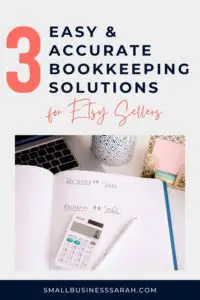Taxes. The word strikes fear in most small business owners. They prefer the ostrich approach to taxes--if I keep avoiding it, everything will be ok. But as much as you dread filing your taxes, it is a necessity. So let’s walk through some of the potentially confusing things together. In this post, I’ll cover the basics of the top section of Schedule C, which is the tax form that all sole-proprietorships and single-member LLC’s must complete with their tax return.
Disclaimer: This post is for information purposes only and does not constitute tax or legal advice. This post contains affiliate links, see my Disclosures here.
More...
The first few lines of Schedule C (A-E) aren’t too bad. It’s the simple name and address information about your business. Let’s dig into the more challenging questions, beginning with line F.
Schedule C Line F - Accounting Method
Line F asks the business owner to specify their accounting method; cash, accrual, or other. The cash method is the easiest and most common accounting method for small business owners. With the cash method, you record income and expenses when money enters or leaves your financial accounts. This might sound obvious, but there are subtle differences between the cash and accrual method.
While the cash method of accounting records transactions when money enters or leaves your accounts, with the accrual method of accounting, revenue is recorded when it is earned, and expenses are recorded when they are incurred.
Let’s look at an example to illustrate. Let’s say you are a blogger. It’s December 31st and you complete a sponsored post, post it to your blog, and complete all required social media tasks per your agreement. Your agreement with the sponsoring company is for $200 in exchange for your post and other social media requirements. You have completed your end of the agreement as of 12/31.
However, the sponsor doesn’t make the payment until they get back to work on January 2nd. With the cash method of accounting, you would record the revenue in January because that is when the cash arrived in your bank account. With the accrual method of accounting, you would record the revenue on December 31st, because you completed the work, fulfilled your part of the agreement, and effectively earned the revenue on that day. See the difference?
For most sole proprietors or single-member LLCs, it’s easier to use a cash accounting system rather than an accrual system. Whichever method you choose, you need to be consistent from year to year and indicate it on your Schedule C.
Schedule C Line G - Material Participation
If the question about accounting method made you groan, the next question is even better. “Did you materially participate in the operation of the business?” To determine whether you materially participated, there is a list of questions the IRS asks.
Basically, they want to know whether you are actively involved in the daily activities of your business. If you worked at least 500 hours in your business during the year (about 10 hours per week), you materially participated.
If you didn’t answer yes to that question, another question asks whether you performed most of the work. Even if you didn’t work 500 hours, if you did most of the work, you materially participated.
Those two questions usually allow you to meet the material participation rule. If you don’t meet the requirement after those questions, use your tax software or the instructions to Schedule C to look up the other questions that might allow you to check the box to say that yes you did materially participate.
Why is being able to say you materially participated so important? If you did not materially participate in the business, the IRS may consider your business to be a passive activity. If it is a passive activity, then you may not be able to count business losses against other types of income. It’s in your best interest to be able to say you materially participated.
Schedule C Line H - First Year in Business Checkbox
Good news! Line H is easy. At the end of your first year in business, you’ll file Schedule C along with your personal tax return. At the top of Schedule C, find line H and simply check the box that you started the business during the year. Now the IRS knows that you are a new business. No other type of business registration is required at the federal level for a sole proprietorship or single-member LLC. Easy!
Schedule C Line I - 1099 Forms
The final questions may really have you scratching your head: “Did you make payments that would require you to file 1099s?” Let’s unpack this one. First, we’ll clarify what a 1099 is. It’s simply an informational form that the IRS uses to make sure revenue that people and businesses earn is accounted for and reported to the IRS.
For a small business owner, the most likely reason you would need to file 1099s is if you paid independent contractors for services they performed for you during the year. These are not employees but individuals you hire to perform certain duties.
Many bloggers employ Virtual Assistants (VAs) for graphic design, video editing, or general administrative work. These VA’s are not employees, but are independent contractors.
Similarly, an Etsy seller may employ a VA to handle customer service emails or edit product listings.
For each VA whom you paid more than $600 in a year, you must file a Form 1099-MISC with the IRS and send the same form to the VA.
There is one exception to this rule. If you paid your VA via a third party processor such as PayPal, you are not required to file a 1099. Instead, a 1099-K will be filed by the third-party processor if certain criteria are met. That makes it so much easier! So if you can, pay your VAs through PayPal or something similar, and avoid the hassle of having to file 1099s at the end of the year.
Need More Information?
Those are the important parts of the top of Schedule C. Schedule C also includes information about revenue and expenses. I’ve written about business expenses here, here, and here and will cover revenue in a future post.
One key for overcoming tax overwhelm is good financial recordkeeping. One of the best tools for bookkeeping is QuickBooks. If you’re interested in learning more about how it can work for your blog, check out this post. I also have a YouTube channel where I demonstrate how to best use QuickBooks for your online business.






